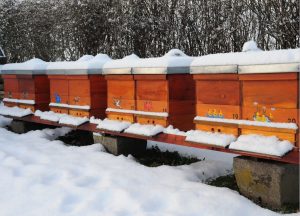The bees have completed their working year, and before the arrival of winter, several key tasks remain to be completed to ensure their survival during the cold months. Beekeepers are now taking measures such as varroa treatment and bee feeding to prepare colonies for winter. Saša Jeremić, a beekeeper from Kamenovo, has done most of the necessary work and now it remains for the bee colonies to cope with the winter period on their own.
One of the most important steps in this period is treatment against varroa, a parasite that poses a serious threat to the health of bees. Jeremic uses a combination of methods, including smoking the hives and using strips such as herba super stick. Diversity in approach is important because, as the beekeeper points out, varroa can become resistant to treatments if only one preparation is used. In addition to the treatment against varroa, bee feeding is nearing its end.
Bees are fed with syrup in a ratio of 2:1, with a thicker syrup being preferred so that the bees can absorb it faster. An alternative is inverted syrup, which is already prepared and makes it easier for the bees to store it as a food supplement. Jeremić mostly leaves the bees with sunflower honey and other honey that they produced themselves, while he uses supplemental food as a supplement so that the bees have enough food for the winter. However, this year’s drought has caused a problem with a lack of pollen, which is important because pollen, along with honey, is crucial for the successful wintering of bees.

Prepare the bees for snow white days
The lack of pollen due to the drought created difficulties, as the bees left less pollen than needed. Fortunately, the rains that followed brought relief, as they encouraged the growth of pollen-producing plants. This pollen is necessary for bees to strengthen and prepare for winter. In combination with honey, it enables successful wintering and strengthening of bee colonies.
Jeremic admits that he was a little late with preparations for the winter, which should have started already at the beginning of August. However, by the end of September, all work should be completed, because bees then enter a quieter period. During that period, they do not spend energy, but produce a winter bee that has a longer lifespan, from five to seven months. At the same time, she should welcome the young bees in the spring.
In conclusion, preparing bees for winter includes treatments against parasites, additional feeding and provision of pollen and honey. At the same time, beekeepers must react in a timely manner in order to ensure the health and survival of their bee colonies during the winter.
Source: Good morning
Source: boljazemlja.com


